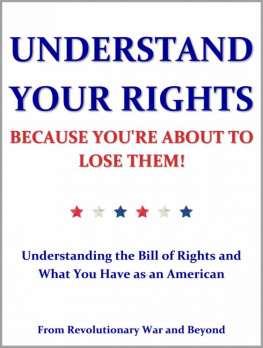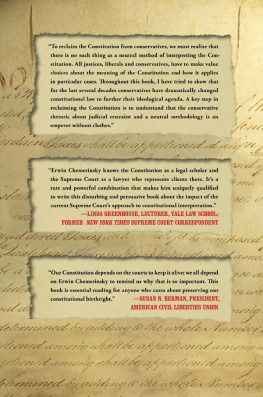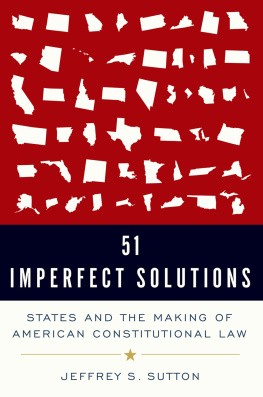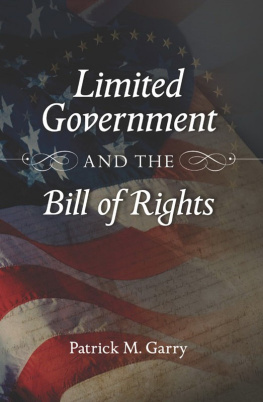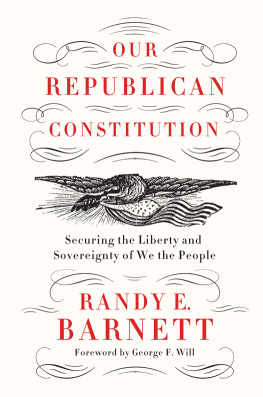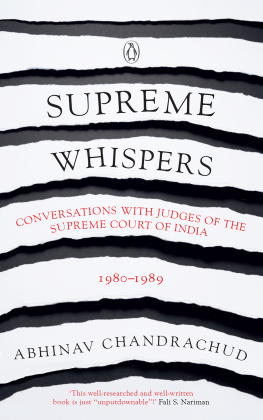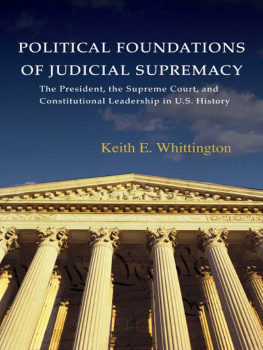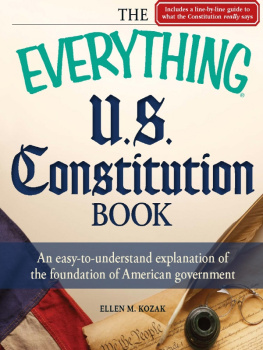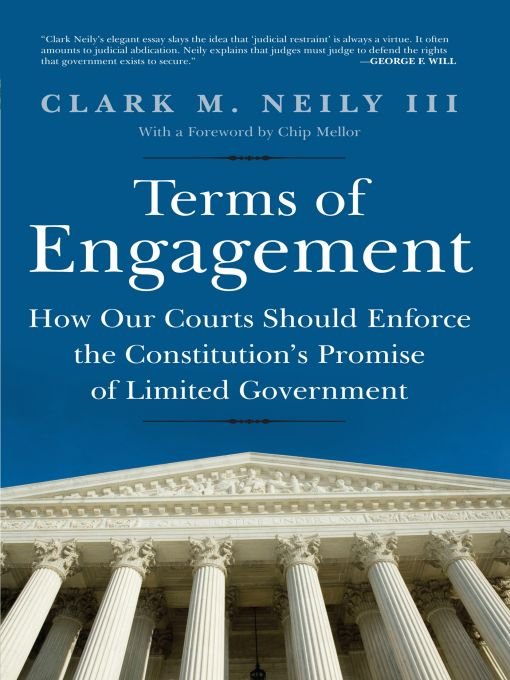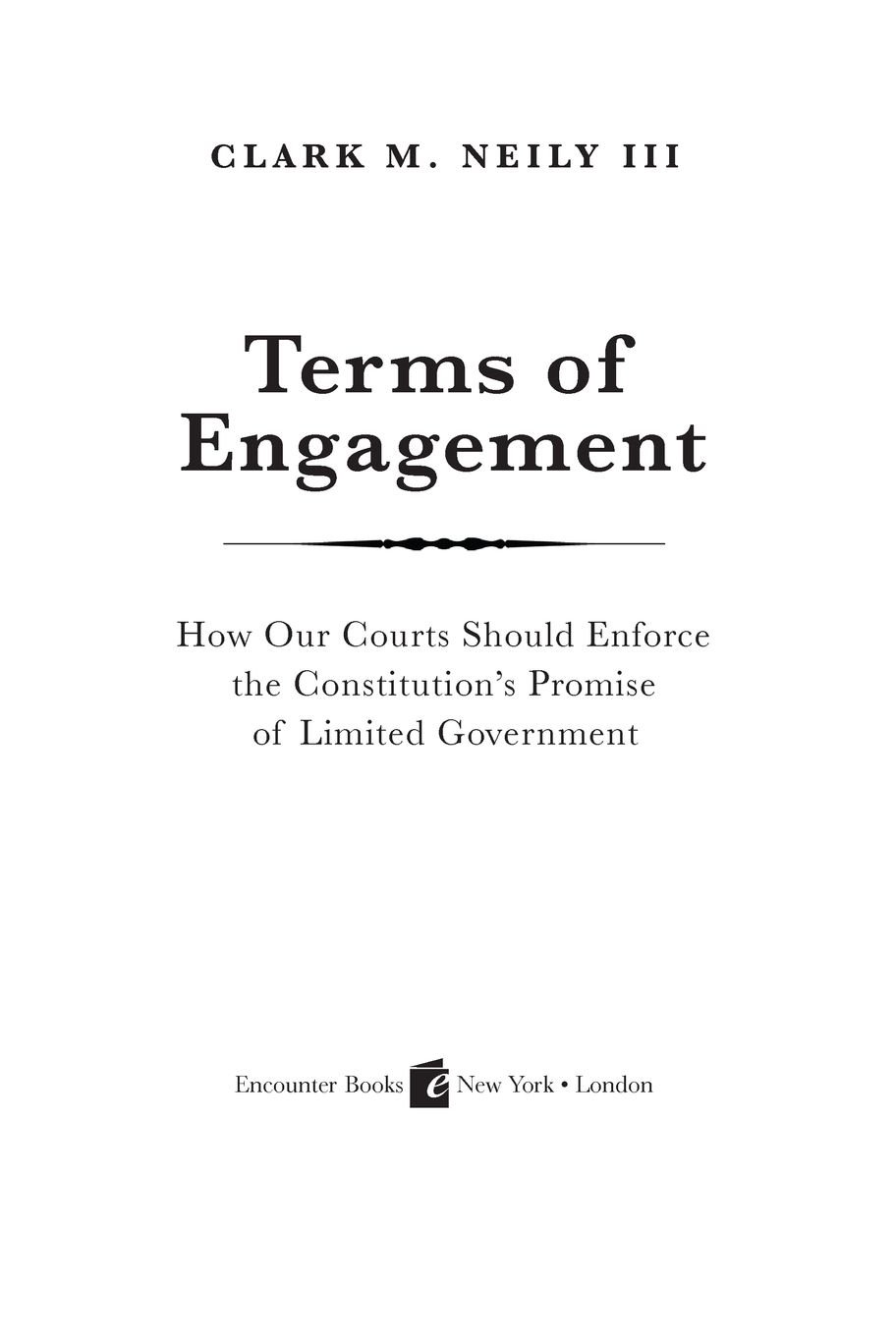Table of Contents
To Nicki
Foreword
Judges matter.
Every litigator knows the moment: hearing the crack of the bailiffs gavel, followed by a solemn voice commanding, All rise. When the judge enters the hushed courtroom to begin a trial or summary judgment argument, the litigators are prepared to marshal their evidence to make the strongest case for their clients. Every detail has been scrutinized and organized, all relevant case law thoroughly mastered. From that opening moment, an effective advocate applies the law to the facts in order to offer persuasive reasons to rule in his clients favor. In many instances, the case will be presented to the judge alone; there will be no jury. The judge weighs the evidence, applies the law, and then issues an opinion. At every stage of a case, through any appeals, judges will play the decisive role in dispensing justice.
Being a judge is hard work and losing parties will always be unhappy, so judges have a real stake in maintaining a reputation for fairness. The respect with which judges and their decisions are received depends on the integrity of those decisions. That integrity rests on their impartiality. Judges are expected to be neutral arbiters who bring wisdom and experience to their task. These attributes need to be consistently applied because every case must be examined on its own merits. The responsibility of weighing evidence and evaluating arguments demands that judges refrain from injecting their personal biases or political beliefs into a case.
But what happens if judges operate under a system in which one side enjoys a practically irrebuttable presumption of legitimacy, so that judges take themselves out of the business of evaluating evidence and consistently rule in favor of that one side? And what does it mean if that presumption doesnt just affect run-of-the-mill cases, but provides the government with a decisive advantage in cases that determine the constitutional rights of all Americans? Indeed, what if judges abdicate their responsibilities and routinely rubber-stamp government actions without regard to the facts or the constitutional provisions designed to limit government?
These are not hypothetical questions. To the contrary, they are questions that go to the heart of constitutional law today.
This book, by a seasoned constitutional litigator, answers these questions and makes a passionate and intellectually compelling case for an engaged judiciary. As an Institute for Justice senior attorney, Clark Neily has represented clients nationwide whose rights have been violated by national, state, or local governments. He has seen firsthand how often the dreams and aspirations of honest, hardworking people are crushed by government when courts abdicate their responsibilities and defer blindly to legislative or executive acts. You will meet some of these IJ clients in the coming pages. Their courage inspires all of us at the Institute for Justice.
There are, of course, defenders of the legal status quo. Apologists for judicial deference claim that the political process is best suited for addressing concerns about government actions. But paeans to democracy notwithstanding, government actions are not entitled to deference simply because they result from a political process involving elected representatives. To the contrary, the Framers were deeply concerned about the dangers of interest-group politics and overreaching government. The structure of the Constitution rejects blind deference to the other branches. The courts job is to block constitutionally forbidden political impulses, not ratify them under the banner of majoritarian democracy.
The philosophy of deference has led to the judiciarys abdication of its essential role in our system of checks and balances so carefully designed by the Framers. As Neily discusses, what began with expedient Supreme Court decisions to legitimize the New Deal has now been institutionalized by both liberals and conservatives. Along the way, provisions of the Constitution intended to limit government power have been stripped of effect, and constitutional protections for individual rights have been severely eroded. Indeed, for such key provisions of the Constitution as the commerce clause, due process clause, takings clause, contract clause, general welfare clause, and privileges or immunities clause, to the extent there is debate today, its whether these provisions impose any limit at all on government power. The result is that our liberties are increasingly dependent on the self-restraint of politicians and government officials.
Its no coincidence that the need for constitutional limits on government power has never been more urgent. A philosophy of judging deemed appropriate seventy years ago brought us to this precipice. That philosophy was never a sound idea, but it is woefully inappropriate and unsuited for the challenges our nation now faces.
This book issues a clarion call for what we need instead: judicial engagement. Courts must fulfill their role as enforcers of the Constitution. They must be the bulwarks of liberty envisioned by Madison. They must, as Hamilton wrote, keep the Congress within the limits assigned by the Constitution. When the legislative and executive branches exceed their limited and enumerated powers, the judiciary must strike these acts down.
Since its founding in 1991, the Institute for Justice has argued for a more engaged judiciary. We have won major cases and learned hard lessons along the way. And we know how far we must yet go. This book reflects wisdom and insights that come from that experience. It presents a well-developed constitutional theory and intellectually rigorous defense of liberty. If there is one overriding insight, its that we must never lose sight of the stakes.
People like the IJ clients featured in this book and so many others seek the chance to live as free and responsible members of civil society. Theirs are the aspirations that can and should define our nations future. But until the judiciary engages, those aspirations will remain at the mercy of increasingly unaccountable government.
Chip Mellor
President and Co-Founder, Institute for Justice
Introduction
Sandy Meadows was a widow who lived by herself in Baton Rouge and loved working with flowers. She had little education and nothing in the bank when her husband died. Shed never had to support herself before, and her only vocational skill was making floral arrangements. Unfortunately, Louisiana is the one state in the country that licenses florists, just like doctors or lawyers.
Sandy tried five times to pass the licensing exam, but it was too subjective. Besides taking a written test, applicants had to make four floral arrangements in four hours. A panel of working florists would grade the arrangements and decide whether the applicant was good enough to set up shop and compete with them. Usually they said no.
When agents of the Louisiana Horticulture Commission found out that Sandy was managing the floral department of an Albertsons grocery store without a license, they threatened to shut it down. The store had no choice but to let her go and hire a state-licensed florist instead. Prevented by government from doing the only work she knew, Sandy had no way to make a living. She had no car, no phone, and, on the last day I saw her alive, no electricity because she couldnt afford to pay her utility bill. In October 2004, Sandy Meadows died alone and in poverty because the State of Louisiana wouldnt allow her to work in a perfectly harmless occupationand I couldnt persuade a federal judge to protect her right to do so.


